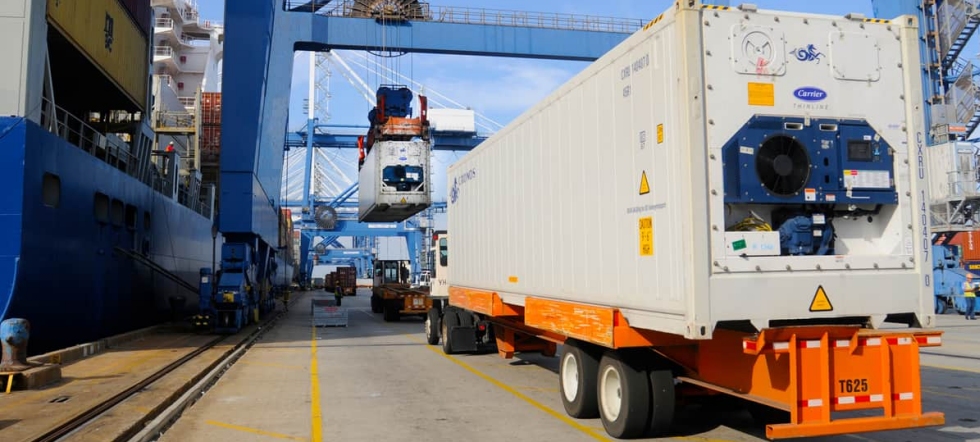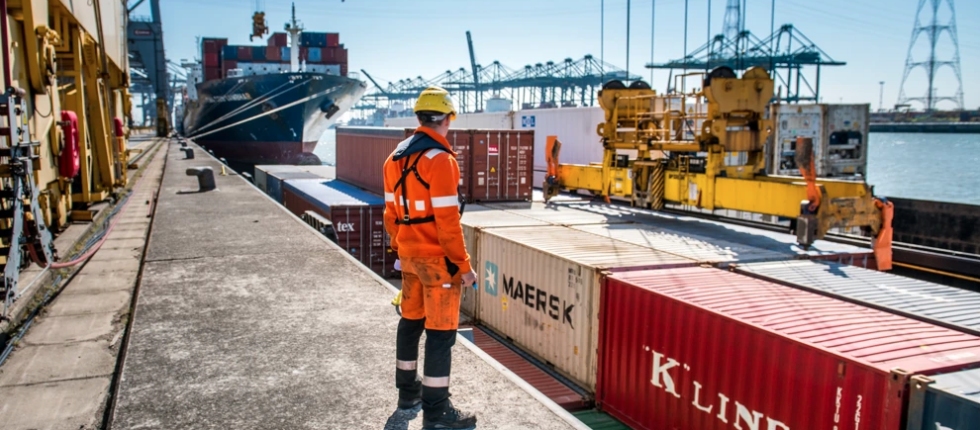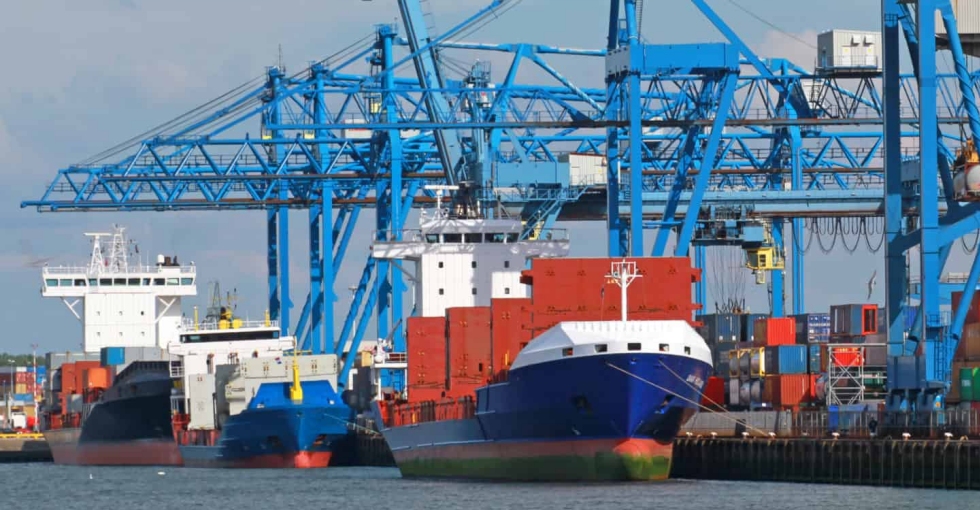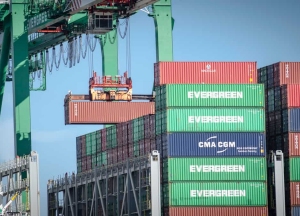JAXPORT Director of Cargo Sales Frank Camp to Serve on Board of Directors for Florida Customs Brokers & Forwarders Association
 May 5, 2020 - JAXPORT Director of Cargo Sales Frank Camp has been selected to serve on the Board of Directors for the Florida Customs Brokers & Forwarders (FCBF) Association. The Doral, Florida-based trade association is the most influential and active representative body of industry professionals serving the state’s import and export community. May 5, 2020 - JAXPORT Director of Cargo Sales Frank Camp has been selected to serve on the Board of Directors for the Florida Customs Brokers & Forwarders (FCBF) Association. The Doral, Florida-based trade association is the most influential and active representative body of industry professionals serving the state’s import and export community.
In addition to freight forwarders and Customs brokers, FCBF members represent industry leaders from throughout the supply chain, including cargo shippers and ocean carriers. FCBF members play an important role in port selection for the cargo community.
“Northeast Florida is a growing player in international trade and we are thrilled to welcome Frank to our team,” said FCBF Board President Gabriel Rodriguez. “His knowledge and experience throughout the supply chain will be a valuable resource for our members as we work to elevate this dynamic industry and grow global trade opportunities throughout the state.”
“Now, more than ever, seamless freight movement is critical to the health of our state and national economy,” said Camp. “I am grateful for the opportunity to serve the industry in this role, while further elevating JAXPORT’s reputation for outstanding customer service and ease of doing business.”
Camp joined JAXPORT in 2014 and is responsible for attracting new business with containerized cargo shippers in the Southeast U.S., growing relationships nationally with freight forwarders and Non-Vessel Operating Common Carriers (NVOCCs), and developing partnerships with business development organizations throughout the region.
JAXPORT is an international trade seaport offering direct ocean carrier services to 140 ports in 70 countries. The port offers containerized cargo service via the world’s major shipping alliances through both the Panama and Suez canals.
About JAXPORT
JAXPORT is an international trade seaport offering direct ocean carrier services to 140 ports in 70 countries. The port offers fast access to 70 million U.S. consumers via 100 trucking firms, three major interstates, and 40 daily trains. For further information, visit: www.jaxport.com
SOURCE: JAXPORT |
|
|

Stevedoring Services Join Forces in Charleston, South Carolina
Three former competitors’ collaboration had drawn criticism from the World Shipping Council and International Longshoremen’s Association
May 5, 2020 (American Shipper) - Competitors officially became collaborators [May 4] as the Charleston Stevedoring Co. (CSC) launched to optimize terminal, vessel and gate operations at the South Carolina port.
CSC is a joint venture of Marine Terminals Corp.–East (Ports America), Ceres Marine Terminals and SSA Atlantic to provide container terminal and stevedoring services at the Port of Charleston.
“The new entity will provide significant benefits to the Port of Charleston, including improved container terminal services through the consolidated operations at all berths as well as more efficient vessel turn times and improved equipment utilization,” CSC President Dan Hall said. “The combined company will optimize use of terminal capacity and improve integration between terminal, vessel and gate operations.”
Terminal operator and stevedore Ports America has operations in every major port in the United States. Transportation services provider Ceres has stevedoring and terminal operations across multiple cargo types. SSA is a wholly owned subsidiary of marine and rail terminal operator Carrix Inc.
In March 2019, Ports America, SSA Atlantic and Ceres filed the Georgia-South Carolina Marine Terminal Operator Cooperative Working Agreement with the Federal Maritime Commission (FMC). According to the proposed agreement, the three companies planned to consolidate their marine terminal services and stevedoring operations at the ports of Charleston and Savannah, Georgia, and operate under the company name NEWCO.
“It’s almost mimicking some of the behavior of the ocean carriers in trying to gain some efficiencies and economies of scale by working together,” South Carolina Ports Authority (SCPA) Chief Operating Officer Barbara Melvin said then.
But in a letter to the FMC dated April 18, 2019, World Shipping Council President John Butler said the formation of NEWCO “raises a substantial threat of reduced competition, threshold Shipping Act jurisdictional questions and multiple factual questions about its scope of information sharing and effects on competition and operations in other ports.”
The International Longshoremen’s Association also opposed the joint venture, telling the FMC that NEWCO would have a veritable lock on competition in the context of both market share and market concentration.”
The petitioners withdrew the proposed agreement in September. Melvin told local media at that time the collaboration was still proceeding in Charleston and that the FMC had determined it had no jurisdiction over the proposed business venture.
The SCPA confirmed Monday that the original three collaborating companies regrouped as CSC and that the Port of Savannah was not part of the operating agreement.
Charleston Stevedoring Co. LLC filed as a Delaware domestic limited liability company on Jan. 29.
SOURCE: American Shipper |
|

Port of Antwerp Says Shortsea Transport is the Future
May 4, 2020 - Shortsea transport is the future, offering countless advantages for shippers and forwarders, according to the Port of Antwerp.
Port of Antwerp offers British and European shippers and forwarders a competitive, sustainable, reliable and rapid transport alternative to road haulage, so that each day cargo reaches its final destination “just-in-time”.
Port of Antwerp currently offers 53 container services per week with destinations ranging from the Mediterranean region and the Iberian peninsula at one end to Russia at the other.
"Our ambition is to offer frequent, regular shortsea services to a number of important destinations," says Dries Van Gheluwe, Key Account Manager Shortsea Shipping at Port of Antwerp. "Container shipping in the first place, but also ro/ro and breakbulk liner services. Our focus regions are currently Spain and Portugal (Iberia), the UK, Ireland and Norway.
"Another trigger to take a close look at your supply chain is the growing focus on sustainable transport and reducing CO2 emissions, as in the European Green Deal. By connecting as many European destinations as possible by shortsea, rail and barge, we offer our customers an end-to-end alternative," Van Gheluwe added.
About Port of Antwerp
The Port of Antwerp is Europe's second-largest port with more than 300 line services to over 800 destinations. The Port annually handles around 238 million tonnes of international maritime freight. For further information, visit: www.portofantwerp.com
SOURCE: Port of Antwerp |
|

Port of Rotterdam Predicts 10-20 Percent Drop in Throughput for 2020
April 21, 2020 - In a quarterly figures report released April 16, the Port of Rotterdam said that total throughput tonnage fell by nine percent year-over-year in the first three months of 2020. The outlook for the remainder of the year appears to be similar, the port's leadership cautioned.
Falling throughput tonnage was seen mainly in coal (-40 percent), crude oil (-8 percent) and oil products (-33 percent). High wind energy production and low natural gas prices meant that coal-fired power plants had lower demand for imported coal this season. On the liquid bulk side, shifts in Russian fuel oil exports meant that Rotterdam handled less bunker fuel transshipment activity, leading to reduced oil product volumes.
However, the port also noted positive developments. LNG imports were up by 18 percent, driven by electrical power generation demand. Container volumes were only down by five percent on a TEU basis relative to Q1 2019, which was a record-setting quarter. The lack of growth in container volume was largely driven by the state of the European economy and ripple effects from the U.S.-China trade war, the port said, as the COVID-19 shutdown in East Asia had not yet begun to register at Rotterdam's container terminals until late March. The impact of a decline in demand due to the coronavirus crisis is expected to become clear from April onwards.
“We are facing unprecedented disruptions and the port of Rotterdam, as a vital process, intends to continue contributing to society. The impact of a decline in demand due to the corona crisis will become clear from April onwards. A 10 to 20 percent drop in throughput volume on an annual basis would seem to be very likely. This will depend on how long the measures remain in place and on how quickly production and world trade recover," said port CEO Allard Castelein in a statement.
SOURCE: The Maritime Executive |
CLECAT Calls for Fair and Equal Demurrage and Detention Charging During the COVID-19 Crisis
 April 2, 2020 - CLECAT (European Association for Forwarding, Transport, Logistics and Customs Services) on April 1 issued a paper, which provides recommendations for a more transparent process with regards to the determination of detention and demurrage practices in container shipping. The paper sets out a number of issues freight forwarders have encountered recently with detention and demurrage charges, including references to the recent European court cases. April 2, 2020 - CLECAT (European Association for Forwarding, Transport, Logistics and Customs Services) on April 1 issued a paper, which provides recommendations for a more transparent process with regards to the determination of detention and demurrage practices in container shipping. The paper sets out a number of issues freight forwarders have encountered recently with detention and demurrage charges, including references to the recent European court cases.
Commenting on the paper, Ms Nicolette van der Jagt, Director General of CLECAT, noted: "Over the last couple of months, we have collected the experiences and concerns of our members with regards to detention and demurrage charges. Today, with the present global crisis caused by the COVID-19 pandemic, these concerns become even more pressing. Whereas our priority remains to ensure that freight keeps moving and containers reach their destination, we believe that all parties in the global maritime supply chain have a common interest to support the overall functioning of the chain.
"Our members are particularly concerned about the impact the different national rules will have on the period of time containers will need to stay in ports before import or export. Above all, we need to keep cargo moving to reach citizens, but in view of restrictions and delays caused by the current crisis, the burden needs to be shared amongst all the parties. As such, CLECAT underlines that charging unreasonable amounts of demurrage and detention should not constitute a revenue model for the shipping lines."
The recent announcements of shipping lines to insist on current tariffs (in Europe), whilst anticipating a slowdown in the supply chains, without any offer of extended free times and review of tariffs, raises concerns among the freight forwarders. Equally, the proposal of carriers to ‘offer a variety of solutions to avoid significant detention & demurrage exposure’ reconfirms the suspicion that carriers are using their position within integrated logistics groups to undercut forwarders by charging D&D to merchants who arrange transport in merchant haulage, but waive the charge for merchants for whom they arrange the transport in carrier haulage. In doing so, the shipping lines are discouraging merchant haulage, thereby reducing competition and choice. Clearly, marketplaces become less efficient when entities have the power to levy unreasonable charges on their competition, and no matter whether the containers move in merchant haulage or in carrier haulage there should be equal and fair treatment of customers.
CLECAT is following with interest the recent US FMC guidance, arguing that demurrage and detention charges are only valuable when they work, i.e. when they are applied in ways that incentivise the merchant to move cargo promptly from ports and marine terminals. Ms van der Jagt concluded: ‘While we appreciate that demurrage and detention charges are an important tool for the shipping lines to ensure the efficient use of their containers, this must be done in a fair and reasonable manner. Demurrage and detention charges must serve their purpose to incentivise cargo interest to move containers, and merchants should not be subjected to such charges if the pickup or return of a container is delayed due to factors beyond their control. This is particularly acute in the wake of the current COVID-19 crisis.’
The full paper can be downloaded via the CLECAT website.
SOURCE: CLECAT |
|
|